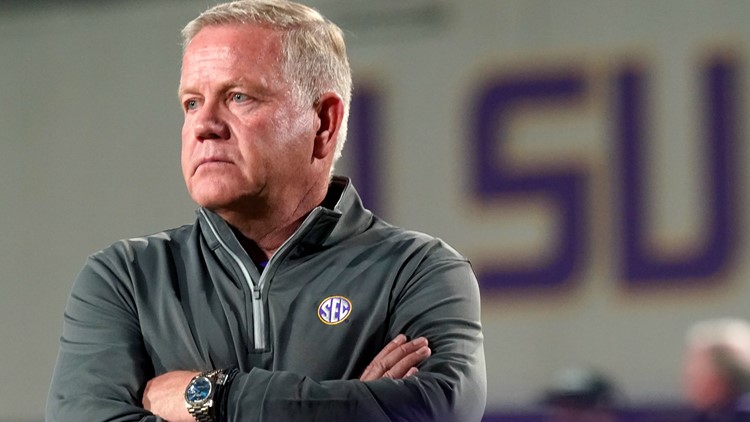BATON ROUGE, La. — On the first floor of the LSU Football Operations Center, left of the front desk, is the performance nutrition center.
With high ceilings and a wall of windows brightening the space, the dining hall seats 170 people and serves meals day and night, often including Louisiana staples such as etouffee and gumbo. Players don't need to leave the building for a freshly cooked meal before or after practice.
If you want to know why Brian Kelly left Notre Dame after 12 years spent leading college football's most storied program to become the coach at LSU, the answer in part lies in one of the nicest cafeterias in college sports.
“It’s been awesome because you’ve got incredible facilities, you’ve got players that want to be great,” Kelly told The Associated Press on the eve of his first spring practice at LSU. "I want to be in an environment where I have the resources to win a national championship. And I came down here because I want to be in the American League East."
Kelly's move to the daunting SEC West was abrupt and his departure from Notre Dame was easily the most stunning move of a wild 2021-22 hiring cycle that included coaching changes at Southern California, Oklahoma, Florida, Miami and Oregon.
Nine weeks after becoming the winningest coach the Fighting Irish have ever had, Kelly left behind the Golden Dome and Touchdown Jesus for Mike the Tiger and Mardi Gras to chase the one prize that has eluded him in a Hall of Fame-worthy career.
A display case on the coffee table in Kelly's office is filled with big, shiny rings from his stints at Division II Grand Valley State, Central Michigan, Cincinnati and Notre Dame. Rings for major bowl games, conference championships, unbeaten regular seasons, playoff appearances and two D-II national titles.
All that is missing for the 60-year-old Kelly is a national championship at the highest level of college football. LSU has won three in the past 19 years, the last two with coaches whose credentials pale in comparison to Kelly's.
Kelly insists Notre Dame can again win it all and he was prepared to spend the rest of his career in pursuit of that goal in South Bend, Indiana. He and is wife, Paqui, had just built a “forever home” a few blocks from campus on Notre Dame Avenue.
At LSU, the roof has already been raised.
“I felt like I did everything that I could at Notre Dame and they felt like they did everything they could for me,” Kelly said. “I felt like we had both got to a point where this is what they could do, right? This is what I did. And we couldn’t get past that. OK? And so here we are.”
The whirlwind courtship of Kelly by LSU took place over the course of about 10 days that included Thanksgiving weekend. Kelly, through his representatives, made several requests for additional resources and improvements at Notre Dame.
“I felt like that what I was looking for was student-athlete centered. And I was pushing for more for the student-athlete. And I wanted to see that piece. And we didn’t seem to be on the same path as to how that was going to get accomplished,” Kelly said.
Among the items Kelly was pushing? A chef dedicated to the football program and a new facility to replace the Guglielmino Athletics Complex, which currently houses the football team and does not have a dining hall.
“We don’t have that,” Kelly said of LSU's nutrition center, reflexively referring to Notre Dame as we. “We hand out food. That’s precooked.”
Kelly's request for a new facility was not new: “I mean, and that’s something that has been on the books since 2016.”
Notre Dame athletic director Jack Swarbrick declined a request for comment from The Associated Press for this story. He has said publicly that Notre Dame, which has an endowment of some $20 billion, is in need of an upgraded football facility.
"We’re trying to nail down what this might look like phased in over time to give us what we need in the facility,” he told the South Bend Tribune last year.
The university had approved a new chef for football, a person familiar with the correspondence and conversations between Kelly, his representatives and Notre Dame last fall told the AP on condition of anonymity because the discussions were private.
But how quickly a new and improved football facility could become a reality at Notre Dame remains unsettled. And so Kelly, with the Fighting Irish still in contention for a playoff spot, accepted LSU athletic director Scott Woodward's offer of a 10-year, $95 million contract to head south.
“I loved my time at Notre Dame,” Kelly said. “We were on different paths and that’s fine. I’m fine with that.”
Woodward has built a reputation for splashy hires during stints at Washington (Chris Petersen), Texas A&M (Jimbo Fisher) and now LSU. He pitched Kelly with a pledge of support and alignment at LSU from the university president on down, but said he didn't need to convince Kelly that LSU could better provide a smoother and more direct path to a national championship.
“He had done the homework and I didn’t have to sell,” Woodward said. “He knew the answer to the question.”
The biggest difference between Kelly's new job and the old one is something Notre Dame could never replicate. Much like real estate, success in college football often comes down to three things: Location, location, location.
Notre Dame relies on a national recruiting plan, more so than any other successful program.
“I’m gone for six weeks at Notre Dame,” Kelly said. “From L.A. to New Jersey to Texas to wherever.”
Now he can jump in his new Tesla Model X Plaid and drive a few hours in any direction to recruit blue-chip prospects.
LSU is the lone Power Five school in a state that has 17 of the top 400 recruits in 247 Sports' current rankings for 2023. By comparison, Indiana, Illinois, Michigan and Ohio have a total of 26. Baton Rouge is also a four-hour drive from Houston, one of the most talent-rich metro areas in the country.
On a sunny spring day in Baton Rouge, Kelly stood on the balcony off his office, pointed out his cool new ride in the parking lot below and chuckled about how it can go more than 130 mph — as if he would ever need that.
He said he is not concerned about being poked fun of for dancing with recruits or that he seemed to suddenly develop a Southern accent after he was introduced as LSU's coach.
Getting to know Louisiana culture has been a blast for the Massachusetts native, though he said the rich food is going challenge his ability to stay fit. He was pleasantly surprised to find out LSU closes for Mardi Gras and that floats use a road outside his office to access a parade route.
“So you got floats going by for three days,” he said. “I’m like, this is different.”
Later, Kelly zipped over to Tiger Stadium in the Tesla for a news conference to preview spring football. The Lawton Room is not all that dissimilar from the Isban Auditorium where his weekly media availabilities were held at Notre Dame. Theater seating. A podium set up in front of the room.
Kelly stood in front of a purple backdrop with rows of the gold LSU logo and took questions for about 25 minutes. High up on the walls that frame the stage are two huge tiger heads.
This is certainly different.



